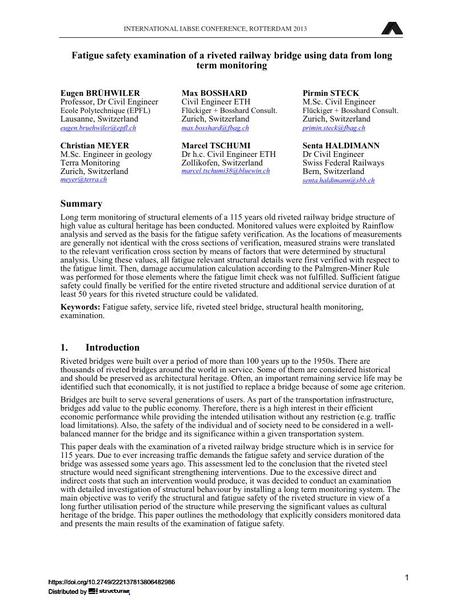Fatigue safety examination of a riveted railway bridge using data from long term monitoring

|
|
|||||||||||
Détails bibliographiques
| Auteur(s): |
Eugen Brühwiler
Max Bosshard Pirmin Steck Christian Meyer Marcel Tschumi Senta Haldimann |
||||
|---|---|---|---|---|---|
| Médium: | papier de conférence | ||||
| Langue(s): | anglais | ||||
| Conférence: | IABSE Conference: Assessment, Upgrading and Refurbishment of Infrastructures, Rotterdam, The Netherlands, 6-8 May 2013 | ||||
| Publié dans: | IABSE Conference, Rotterdam, May 2013 | ||||
|
|||||
| Page(s): | 184-185 | ||||
| Nombre total de pages (du PDF): | 8 | ||||
| Année: | 2013 | ||||
| DOI: | 10.2749/222137813806482986 | ||||
| Abstrait: |
Long term monitoring of structural elements of a 115 years old riveted railway bridge structure of high value as cultural heritage has been conducted. Monitored values were exploited by Rainflow analysis and served as the basis for the fatigue safety verification. As the locations of measurements are generally not identical with the cross sections of verification, measured strains were translated to the relevant verification cross section by means of factors that were determined by structural analysis. Using these values, all fatigue relevant structural details were first verified with respect to the fatigue limit. Then, damage accumulation calculation according to the Palmgren-Miner Rule was performed for those elements where the fatigue limit check was not fulfilled. Sufficient fatigue safety could finally be verified for the entire riveted structure and additional service duration of at least 50 years for this riveted structure could be validated. |
||||
